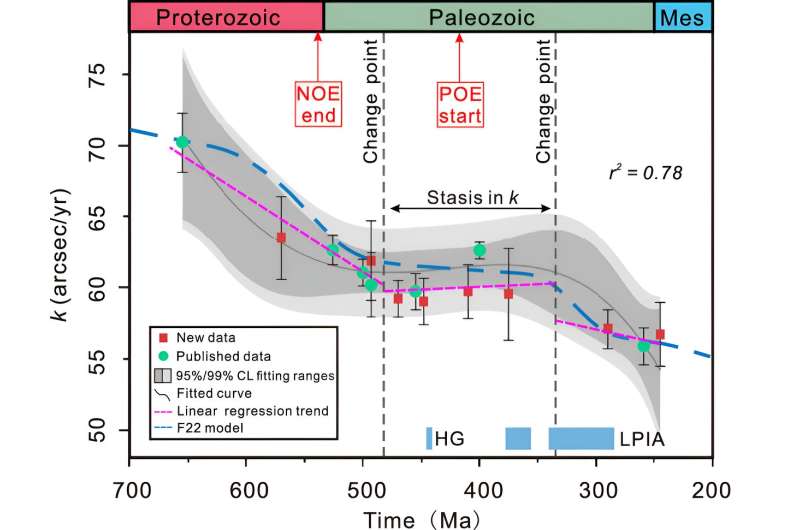
A team of geoscientists from various institutions has uncovered that Earth's rotation slows down in a staircase-like pattern, marked by two distinct stable phases. Their study, published in the Proceedings of the National Academy of Sciences, is based on sediment sample data extending over 500 million years.
Earlier research showed that Earth's spin is gradually slowing due to tidal forces, but the rate of this deceleration had not been consistently tracked. This new study aimed to fill that gap by analyzing data from the past 650 million years.
The team examined eight geological datasets collected over many years. These sedimentary records offer insights not only into geographical changes but also into Earth's rotational history. The data spans from 280 to 650 million years ago.
Their analysis revealed that Earth's rotational slowdown has occurred in a stepwise fashion rather than continuously. This pattern consists of periods of deceleration followed by phases of stability. Notably, the study identified two significant stable periods: one that coincided with the Cambrian explosion, a major surge in animal diversity, and another that aligned with the largest mass extinction event. The researchers suggest that these stable intervals might be connected to the previous slowdowns.
The research also confirmed that, except for recent times when human impact has disrupted environmental patterns, the deceleration of Earth’s rotation has been primarily due to tidal dissipation. This process involves the conversion of orbital and rotational energy into heat, affecting the ocean's surface, Earth's interior, or the moon itself. Tidal heating occurs as the moon's gravity causes stretching and compression as it orbits Earth.
Additionally, the study found that during the period analyzed, the moon has drifted approximately 20,000 kilometers away from Earth, and the length of a day has increased by about 2.2 hours. The research team plans to further investigate the links between Earth's rotational changes and major environmental shifts.

:max_bytes(150000):strip_icc():format(webp)/alec-baldwin-torino-film-festival-121824-3cf7cfbe5c4f4bcbb9197de4de062ea6.jpg?strip=all&resize=370,370)
:max_bytes(150000):strip_icc():format(webp)/Jimmy-Fallon-and-Prince-Harry-092624-baa1362d743d4f39a7d60bf57eb6e8b2.jpg?strip=all&resize=370,370)
:max_bytes(150000):strip_icc():format(webp)/randy-moss-121324-40b858c71b0f40bfa399e2fe00152b2a.jpg?strip=all&resize=370,370)
:max_bytes(150000):strip_icc():format(webp)/scandal-kerry-washington-121824-c51a2b5f0ef741268474bec2498c285a.jpg?strip=all&resize=370,370)
